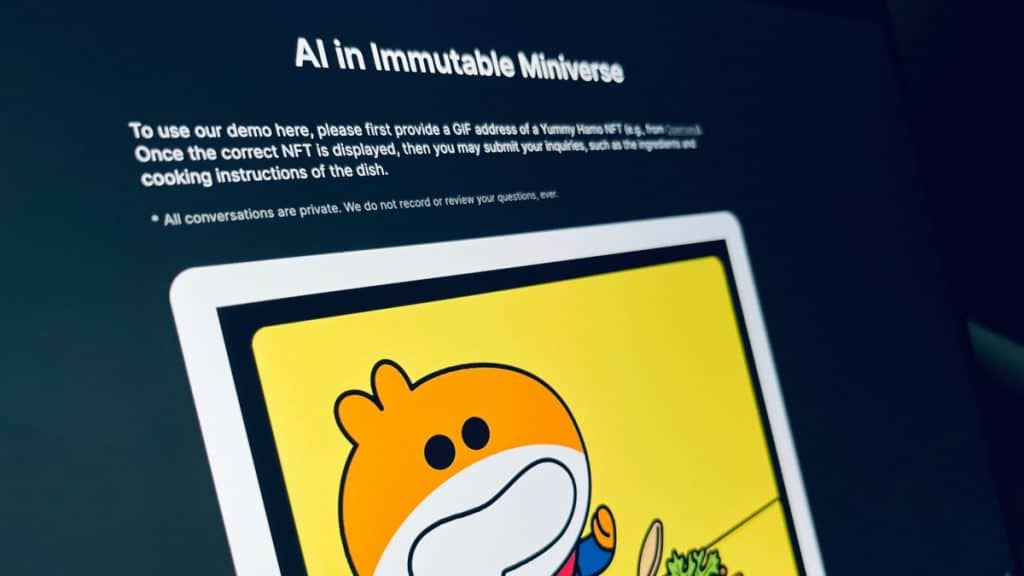[ad_1]

In Brief
Hitch Interactive has integrated LLMs into its Immutable Miniverse NFTs, to allow users converse within the embedded Immutable NFTs.

Next-gen technology company Hitch Interactive today announced it has integrated large language models (LLMs) into its Immutable Miniverse NFTs, aiming to usher a new era of decentralized AI applications on Web3.
The new service, aptly named AI in Immutable Miniverse (AIIM), introduces a novel phase of utility and functionality for NFTs. With AIIM, owners and viewers can engage in conversations within the embedded NFTs. Upon selecting a Yummy Hamo NFT on the Hitch1999 site, viewers can pose various questions about the embedded information.
Importantly, Hitch Interactive said it ensures complete privacy with its LLM deployment, as no user information is recorded or shared with the company or any third party. The knowledge used for private conversations is confined to the embedded information within the NFT.
“We see tremendous opportunities in offering private and decentralized LLMs for both 2C and 2B applications. Contrary to the current public GPT products, decentralized LLMs will move efficient GPT inferencing to the edge local computers, and will be able to better protect users’ privacy without the need of an Internet connection,” Allen Yang, co-founder of Hitch Interactive told Metaverse Post.
“Although current Web3 applications are mostly focused on defi, the NFT technologies that focus on storing and tokenizing decentralized, immutable, and permanent data will be well suited to be a foundation for serving private user data when LLMs are integrated in Web3 applications,” he added.
Earlier this year, Hitch Interactive introduced the Immutable Miniverse Format (IMF) on its Hitch1999 platform. The format allows for the embedding of immutable information into programmable NFTs, which can then be seamlessly integrated with existing social networks.
The IMF standard empowers users to embed diverse information, including data guiding LLMs in intelligent conversations with humans. Notably, the limited edition Yummy Hamo collection of curated gourmet miniverses showcases this cutting-edge generative AI functionality.
“Different from the traditional NFTs that only tokenize images and artwork, Immutable Miniverse NFTs are capable of directly affecting the behavior of the LLMs when the encoded data are used to fine-tune the LLMs. The message encoding is also done in compressed formats as part of the GIF image,” said Hitch Interactive’s Allen Yang. “Therefore when the NFTs are distributed through the existing social networks, no specific bridges will be needed for these Web2 platforms to interact with Web3, as long as these social networks can work with GIF files.”
Empowering NFT Development Through Generative AI
Hitch Interactive asserts that AIIM distinguishes itself from conventional GPT services by offering embedded information forming the basis of LLM conversations is immutable, individualized and decentralized.
The company said that conversations with such embedded information prioritize privacy and do not rely on public GPT services.
Moreover, Hitch announced that future iterations will allow users to run their LLM models locally on their computers.
“The embedded information is in compressed format and visualized in GIF files. This makes the data embedding process compatible with the dominant NFT use case of tokenizing images and artwork. Users can choose to use either public or private encryption keys to encode their message,” Hitch Interactive’s Allen Yang told Metaverse Post. “The embedded information can be any binary data type, from a plain text such as in the Yummy Hamo collection to minigame executables, snapshot of a GitHub repository, and LLMs’ fine tune instructions.”

The integration of NFTs with the IMF standard and LLMs lays the groundwork for the upcoming Hitch Mint product. Hitch Mint aims to enable users to embed personalized information into NFTs beyond the Yummy Hamo collection.
Additionally, the company said Hitch Mint will facilitate the deployment of a small model LLM service on local computers, ensuring fully decentralized and private AI conversations.
“Hitch Mint will allow users to fully customize their own NFTs and embed their own messages. It will also allow users to choose to embed information publicly or controlled by a private encryption key known to only selected few. Having a local LLM model, which will be a small language model that can be run on modern PC’s CPU or GPU,” explained Allen Yang. “It will be integrated with popular browsers so that when Immutable Miniverse NFTs pop up on other social networks, Hitch Mint will be ready to decode the embedded messages, run embedded binary code, or activate the LLM to allow users to engage in conversations.”
The generative AI integration marks a significant step towards fully decentralizing the embedding of knowledge and deploying LLM services, aiming to positioning Hitch Interactive at the forefront of the evolving Web3 landscape.
“We have seen the exponential growth of GPT when its service revolutionizes a better way for users to interact with the world’s data using intuitive natural languages. We believe NFTs are powerful technologies to authenticate and permanently store the world’s data, and hence foster a perfect marriage between AI and Web3,” Hitch Interactive’s Allen Yang told Metaverse Post.
Disclaimer
In line with the Trust Project guidelines, please note that the information provided on this page is not intended to be and should not be interpreted as legal, tax, investment, financial, or any other form of advice. It is important to only invest what you can afford to lose and to seek independent financial advice if you have any doubts. For further information, we suggest referring to the terms and conditions as well as the help and support pages provided by the issuer or advertiser. MetaversePost is committed to accurate, unbiased reporting, but market conditions are subject to change without notice.
About The Author
Victor is a Managing Tech Editor/Writer at Metaverse Post and covers artificial intelligence, crypto, data science, metaverse and cybersecurity within the enterprise realm. He boasts half a decade of media and AI experience working at well-known media outlets such as VentureBeat, DatatechVibe and Analytics India Magazine. Being a Media Mentor at prestigious universities including the Oxford and USC and with a Master’s degree in data science and analytics, Victor is deeply committed to staying abreast of emerging trends.
He offers readers the latest and most insightful narratives from the Tech and Web3 landscape.

Victor Dey

Victor is a Managing Tech Editor/Writer at Metaverse Post and covers artificial intelligence, crypto, data science, metaverse and cybersecurity within the enterprise realm. He boasts half a decade of media and AI experience working at well-known media outlets such as VentureBeat, DatatechVibe and Analytics India Magazine. Being a Media Mentor at prestigious universities including the Oxford and USC and with a Master’s degree in data science and analytics, Victor is deeply committed to staying abreast of emerging trends.
He offers readers the latest and most insightful narratives from the Tech and Web3 landscape.
[ad_2]
Read More: mpost.io









 Bitcoin
Bitcoin  Ethereum
Ethereum  Tether
Tether  XRP
XRP  Solana
Solana  USDC
USDC  TRON
TRON  Dogecoin
Dogecoin  Lido Staked Ether
Lido Staked Ether  Cardano
Cardano  Wrapped Bitcoin
Wrapped Bitcoin  Hyperliquid
Hyperliquid  Wrapped stETH
Wrapped stETH  Sui
Sui  Bitcoin Cash
Bitcoin Cash  Chainlink
Chainlink  LEO Token
LEO Token  Stellar
Stellar  Avalanche
Avalanche  Toncoin
Toncoin  WhiteBIT Coin
WhiteBIT Coin  USDS
USDS  Shiba Inu
Shiba Inu  WETH
WETH  Wrapped eETH
Wrapped eETH  Litecoin
Litecoin  Binance Bridged USDT (BNB Smart Chain)
Binance Bridged USDT (BNB Smart Chain)  Hedera
Hedera  Monero
Monero  Ethena USDe
Ethena USDe  Polkadot
Polkadot  Bitget Token
Bitget Token  Coinbase Wrapped BTC
Coinbase Wrapped BTC  Uniswap
Uniswap  Pepe
Pepe  Pi Network
Pi Network  Aave
Aave  Dai
Dai  Bittensor
Bittensor  Ethena Staked USDe
Ethena Staked USDe  BlackRock USD Institutional Digital Liquidity Fund
BlackRock USD Institutional Digital Liquidity Fund  OKB
OKB  Aptos
Aptos  Cronos
Cronos  Internet Computer
Internet Computer  NEAR Protocol
NEAR Protocol  Jito Staked SOL
Jito Staked SOL  Ethereum Classic
Ethereum Classic  Ondo
Ondo